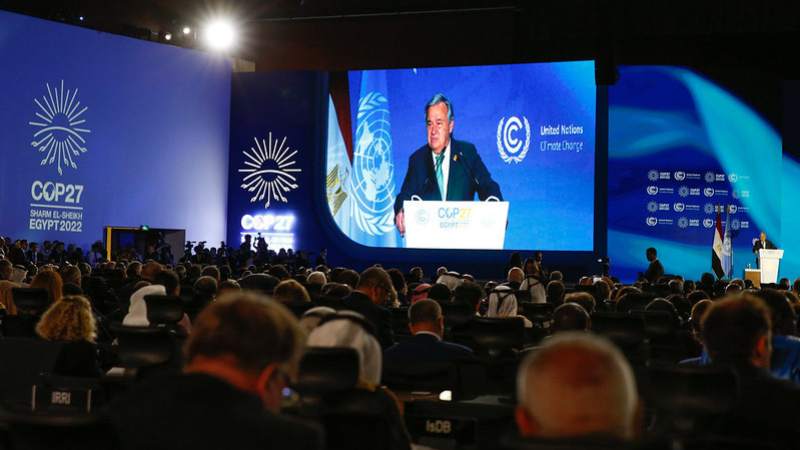A WFO delegation of over 100 farmers’ leaders, women, young and male was at COP 27 to bring a strong independent united voice into the debate and reiterate that farmers are amongst the first impacted by climate change and are at the heart of climate solutions. Their fundamental role in our food systems of feeding the world while protecting the environment must be fully recognized.
The United Nations Climate Change Conference COP 27 closed on Sunday, November 20, in Sharm El-Sheikh, Egypt, after prolonged negotiations with the adoption of several decisions, including the agreement to provide “loss and damage” funding for vulnerable countries hit hard by climate disasters.
Still, “COP27 concludes with much homework and little time. We are already halfway between the Paris Climate Agreement and the 2030 deadline,” stated the UN Secretary-General at the conclusion of COP27 in Sharm el-Sheikh.
Regarding food systems, food production, and agriculture, the level of attention at COP 27 was higher than ever before.
This year’s Climate Change Conference hosted the first-ever Food Systems Pavilion. The World Farmers’ Organisation (WFO) was involved with farmers’ friends like the Just Rural Transition, the Food and Land Use Coalition (FOLU) and Clim-Eat, to name a few.
This Pavilion, together with the first Food and Agriculture Pavilion and the Food4Climate Pavilion, provided much-needed spaces for the world farmers’ voice to be heard loud and clear on topics ranging from nature-positive production and soil health to climate-resilient agriculture and innovation.
The Adaptation & Agriculture Day on November 12 – at which the Egyptian COP Presidency launched its Food and Agriculture for Sustainable Transformation (FAST) initiative – ensured agriculture and food systems were more prominent than ever.
A WFO delegation of over 100 farmers’ leaders, women, young and male, in a joint effort with other fellow food producers’ organisations from different corners of the globe, was at COP 27 to bring a strong independent united voice that of the Farmers’ Constituency into the debate and reiterate that farmers are amongst the first impacted by climate change and are at the heart of climate solutions. Their fundamental role in our food systems of feeding the world while protecting the environment must be fully recognised.
They came to Sharm El-Sheikh, showing the world what they are already doing to provide healthy and nutritious food, fight climate change, protect and enhance biodiversity and pave the way to a more sustainable future for our people and our planet, and signed a joint statement to call the world leaders for climate policy to put the world food producers at the centre.
Indeed, concerning agriculture, COP27 aimed to complete the work under the Koronivia Joint Work in Agriculture (KJWA) launched in 2017 and to agree on the future of climate work on agriculture under the UN Framework Convention on Climate Change.
The agreement among the parties to establish a four-year Sharm el-Sheikh Joint Work on Implementation of Climate Action on Agriculture and Food Security represents an outstanding political achievement for WFO and the whole Farmers’ Constituency, which WFO has the honour of serving as the leading organisation since its establishment.
The decision adopted on climate work on agriculture includes a comprehensive summary of the outcome of the work done by the KJWA over the past five years. It specifies several critical actions by which to promote the sustainability of agriculture, strengthen the adaptation of agriculture to climate change and mitigate emissions from agriculture.
By the end, agriculture has emerged stronger from COP 27 compared to other years. Still, to ensure that action is timely, effective and lasting, governments must work closely with those at the heart of our food systems and at the frontlines of the climate crisis, the farmers.

“We, farmers, are here to fully support governments in implementing the Paris Agreement. We offer farmer-driven, science-based solutions ready to be scaled up and replicated. What we need is the opportunity to co-design policy and programmes with you and the needed financial support to accompany you in the transition,” stated the WFO President Arnold Puech d’Alissac during his speech at the launch of the Food and Agriculture for Sustainable Transformation (FAST) initiative, on November 12.
Climate Change does not stop, and neither do farmers. It is imperative to leverage the momentum. Full speed ahead towards COP 28 in the United Arab Emirates!
